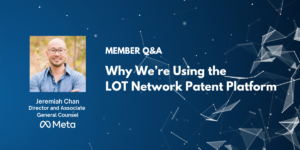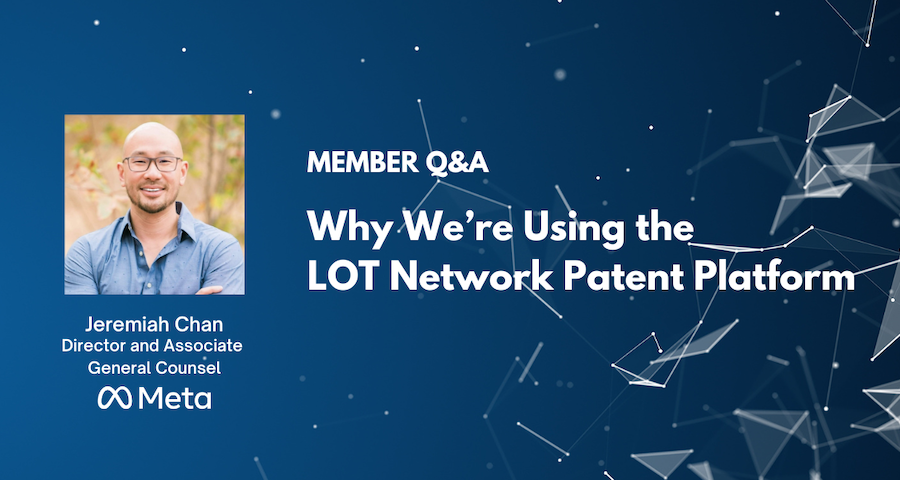
In November 2017, Meta joined LOT Network. Why did Meta join?
For many years, I have shared Meta’s belief that a well-balanced patent system promotes innovation, makes bringing new products to market more manageable, and facilitates competition. Only a well-balanced system that ensures patent quality and provides for easy dispute resolution can incentivize innovation while minimizing barriers to bringing new products to market. This protects the ability of patent owners to exclude others from practicing their patented inventions and protects against abusive patent assertions that would extort innovators with the threat of endless lawsuits.
Today the technology landscape may be different with the emergence of generative AI and the metaverse, but the need for balance remains as patent assertion entities (PAEs) continue to tax innovation with abusive litigation practices. LOT Network is a critical tool in ensuring that balance.
In your view, how does LOT Network foster a balanced patent system?
LOT Network brings together diverse perspectives, expertise, and resources across companies. We think that’s a good thing: LOT Network affords us an opportunity not only to learn from other companies and join other IP leaders in supporting industry-wide DEI initiatives, but also offers benefit
s like the ability to sell or transfer patents to people who need them for legitimate purposes, free of brokerage fees while continuing to protect innovation by keeping assets within the network.
LOT members agree that if, and only if, a member’s patent is sold to a PAE, all members within the network are immunized against PAE lawsuits with respect to that patent. Membership doesn’t otherwise affect a patent owner’s ability to use its patents. Patent owners are still free to sell them to anyone, or assert them against other operating companies – even if those operating companies are members of LOT Network.
Meta recently transferred patents to fellow LOT members Starbucks and Instacart. Why did you use the LOT platform to do it, and what are Meta’s future plans on patent transfers?
Collaboration between companies fosters innovation. Patent transfers, however, are one area where collaboration is typically the exception – and we at Meta want to change that.
We see it as a win-win: We’re able to support innovation by sharing our patents, and receiving parties like Starbucks and Instacart can use those patents to bolster the strength of their IP rights. We’ve also been able to enjoy the benefits of community, from networking with other IP leaders across industries to supporting IP-wide DEI initiatives.
Our portfolio includes hard-won innovations in augmented and virtual reality, infrastructure, communication, commerce, artificial intelligence, machine learning, and connectivity – assets that could be useful as part of a company’s IP strategy. Sharing these assets makes our ecosystem stronger – by allowing other operating companies to acquire patents that they can use to protect their innovation.
We plan to continue to transfer these assets going forward. To that end, we’d love to see the LOT community grow – the more companies that participate in this type of cooperation, the more we can create value, sustainable growth, and a balanced patent system that serves everyone.



